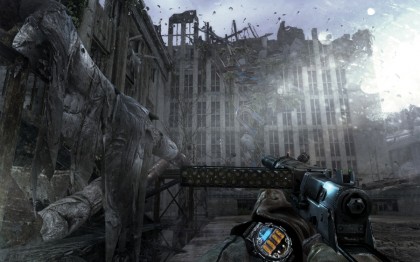Can a Mac be a gaming PC? How the world is changing for Mac gamers
It's time for gamers to pay attention to Apple's hardware again
The iPhone was perhaps the more important element, though. Once the SDK was released, gaming absolutely blew up on the iOS App Store. Suddenly, Apple and gaming weren't just being mentioned in the same sentence, but extra phrases like 'future of handheld consoles' were also being thrown in. Big developers started jumping on board and, crucially, made a bunch of money, too.
During this time, Mac sales were ticking up as most of the PC industry slowed and started contracting. At the same time, the Apple audience had showed that it did, in fact, like games, and was willing to pay for them. It was only a matter of time until Steam showed up, and where Steam goes, so go the games. In 2010, sure enough, Valve launched its store and many of its Source games for Mac as well.
The goods

Although the Mac is still a second-class citizen compared to Windows, receiving big titles after a delay of several months, it is getting them. The likes of XCOM: Enemy Unknown, SimCity, BioShock Infinite and Metro: Last Light all arrived on Mac within a few months of their original release - SimCity even had launch issues, as if to prove that we're all equals.
For Feral Interactive, responsible for porting Tomb Raider, the Total War series and XCOM, among others, strategy games tend to be the best sellers. It's no surprise, then, that XCOM: Enemy Within is due to release on Mac on the same day as Windows.
It's easy to look down on having to wait a few months for games, but in this, Windows and Mac users aren't so different. Too often, the PC finds itself getting the short end of the joystick, getting console ports that are often delayed or badly done. Now spare a thought for your Mac-playing brothers. Windows is the console to them.
Console yourself
As with console games coming to PC, the problem for Mac games is the effort involved in getting the ports working well. The Direct3D elements used to power the graphics in Windows games must become OpenGL elements for Macs, and the whole thing needs to run on the different software platform.
"In the past we have found that some new graphics effects available in the latest version of DirectX are not easily reproduced on the Mac using OpenGL," says David Stephen, managing director of Feral Interactive. "In such cases, we look for the best way to create those effects with the minimum hit on performance, but there is usually a trade-off involved. However, Apple's support for OpenGL 4.0 and 4.1 in Mavericks means that more processing can now be done natively on the graphics card, and that will definitely help with the performance side of things."
Sign up for breaking news, reviews, opinion, top tech deals, and more.
The technical effort of porting is just one element, though. "Delays are principally due to the Mac developer/publisher (in this case Feral) not receiving the assets they need to start the porting process until after the Windows version of the game has been released," explains David Stephen. Even this step of starting ports can only come after business negotiations between all the companies involved, which can be complicated.
"We have been working with our partners so that we can commence on the port while the original game is still in development," adds Stephen, but this carries its own potential issues. If the game is being ported while still in active development, changes made by the main development team can have a knock-on effect on the port. The Mac version also needs its own separate QA testing, and then even once it's finished, it can be delayed further while awaiting final approval from the publisher.